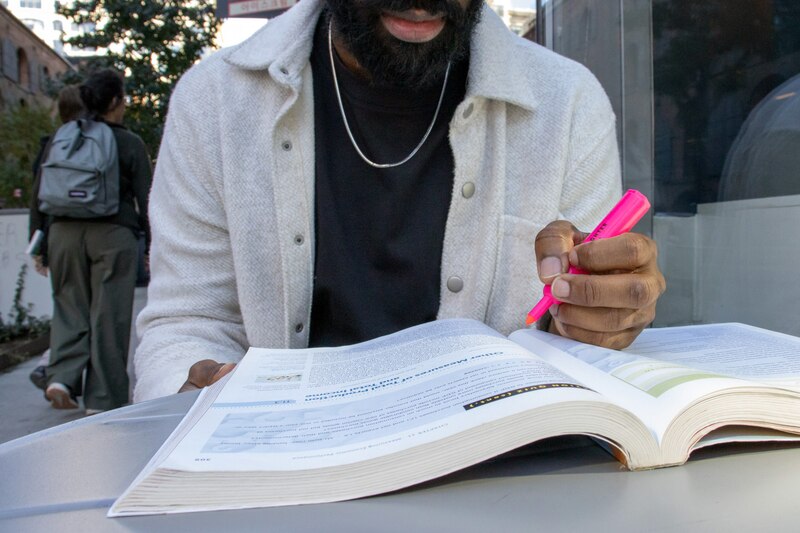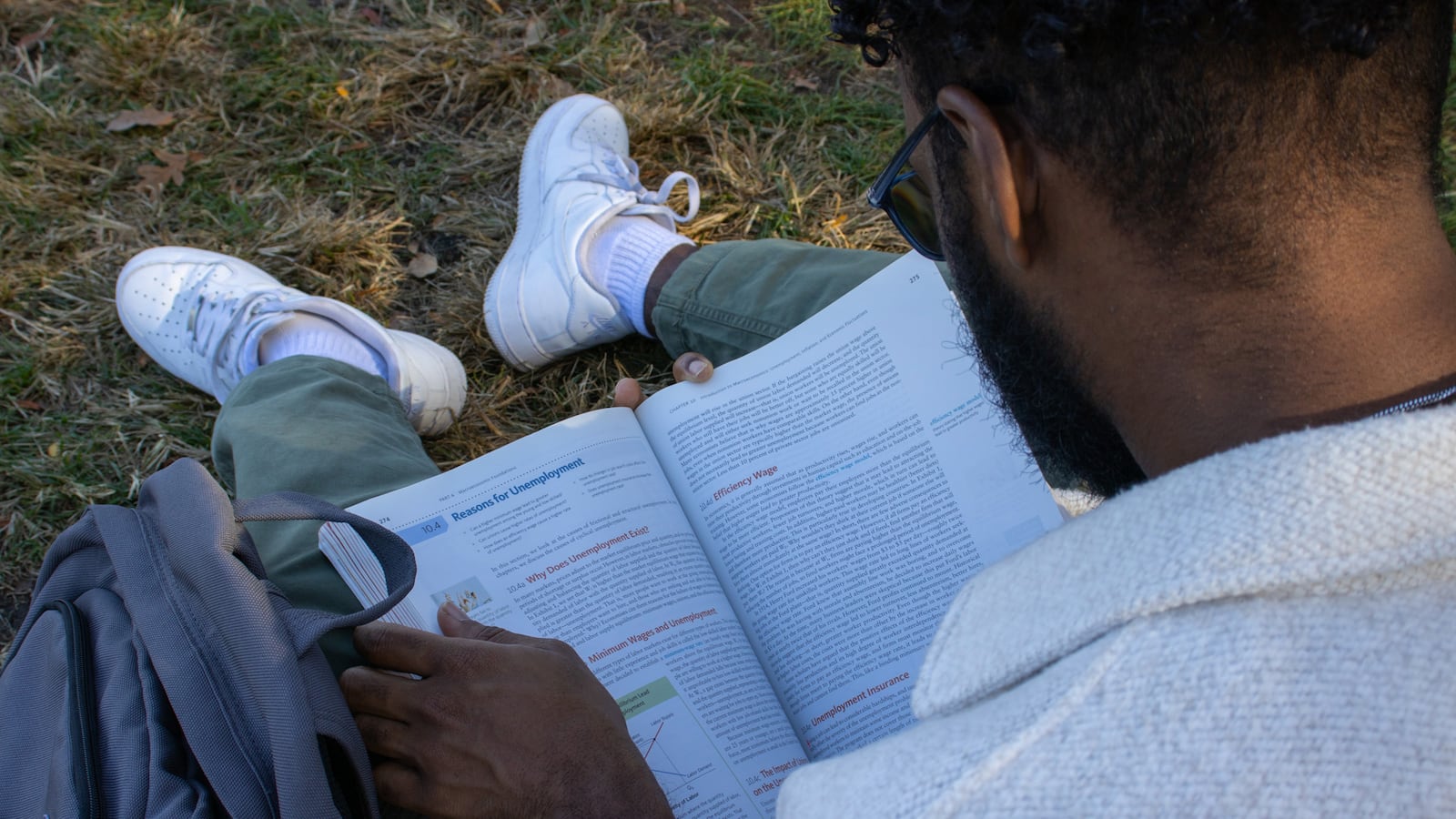Sign up for Chalkbeat New York’s free daily newsletter to get essential news about NYC’s public schools delivered to your inbox.
Before starting at his Harlem high school, Jeurry always assumed he was progressing appropriately in school, despite having significant learning challenges.
However, in his freshman year, he began to notice himself struggling to read longer words and more complex sentences.
As he grew increasingly overwhelmed, it became clear that the small classes exclusively for students with disabilities that he had been in since kindergarten had not adequately prepared him for high school.
Still, Jeurry managed to pass nearly all his classes. His final meeting with his Committee on Special Education — which consisted of Jeurry’s mom and several faculty members — took place in December 2016. By then, the senior had earned 45 credits — 44 were required to graduate — and a C+ average, records show.
But Jeurry was devastated to learn that he would not earn a diploma.
The reason was based on a decision the committee made when Jeurry was in sixth grade and, according to records, never revisited while he was in high school. At that time, the educators concluded that Jeurry could not learn grade-level curriculum. They decided he would be “alternately assessed,” or evaluated based on lower achievement standards. New York State students who take alternate assessments through high school cannot earn a diploma, a prerequisite for military service, many jobs, and most degree- or certificate-granting college and trade school programs.
Heartbroken, he begged the faculty to find a solution during the 2016 meeting. “They didn’t even care,” Jeurry said. “They just wanted me to ‘graduate’ and get out.”
Jeurry, who is now 26 and was diagnosed with a mild intellectual disability after graduating high school, requested that his last name be withheld over concerns about the stigma surrounding intellectual disabilities.
Special education advocates say the systemic failures that led to Jeurry’s situation eight years ago continue to jeopardize the futures of similar students. Last school year, 6,116 New York City students took the New York State Alternate Assessment, according to state data. Federal law requires that states offer such assessments for students with disabilities who are incapable of taking state tests. Importantly, it also states that only “students with the most significant cognitive disabilities” can take the alternate assessment, and that schools must fully inform parents of the potential ramifications. (State education departments are responsible for ensuring compliance with these mandates.)
Too often, however, those standards are neither maintained nor enforced, special education advocates, teachers, and families told Chalkbeat. Instead, factors like under-resourcing, nebulous procedures, and a failure to equip parents to make fully informed decisions have led schools to place some students without significant cognitive disabilities on a non-grade-level, non-diploma track. Students who take alternate assessments are typically placed in non-inclusive, low-rigor settings, which can deprive them of academic and socialization opportunities.
At the December 2016 meeting, the members of Jeurry’s special education committee said their hands were tied. According to documentation from the meeting, Jeurry’s mother said “she was not made aware of the long-term effects of alternate assessment when it was first initiated or during any supplemental [meetings].”
“They would always tell my mom, ‘His diploma is going to be real,’” Jeurry said. “She kept believing them.”

In response to requests to interview state special education leadership, a New York State Education Department spokesperson said in an email: “NYSED is committed to working with schools and parents to determine the appropriate participation of students with disabilities in [the alternate assessment] and to fully understand the impact it has on these students.”
Since New York’s alternate assessment is used to meet federal special education law requirements, the spokesperson said, “there are very strict criteria for its development, administration, and applicability to students.”
Christina Foti, the city Education Department’s deputy chancellor for inclusive and accessible learning, acknowledged that there is room for more robust safeguards, and she said the Education Department recently recommended that the state consider several alternate assessment-related policy changes. They include clarifying definitions and participation criteria, requiring the use of a decision-making flowchart and checklist, and mandating that special education committees “conduct a complete and up-to-date battery of psychoeducational assessments” before making assessment decisions.
The Education Department is also pursuing local-level reforms, but officials are still in the early stages of developing a “definitive language and shift in practice [and] policy,” Foti said.
Inequitable outcomes for students on non-diploma track
In New York, special education committees determine annually how students will be assessed, usually starting around third grade. Although the state has established participation criteria for the alternate assessment, deciding whether students meet those criteria can be a relatively subjective process.
Data obtained through a public records request show that students placed on the non-diploma track are disproportionately Black or English language learners. Last school year, 29% of New York City students who took the alternate assessment were Black, while Black children represented only 20% of all students and 26% of those with disabilities. More than 29% of students who were alternatively assessed were English learners, while such students accounted for just 19% of the school system’s overall population and 14% of students with disabilities.
There have been some signs of progress toward ensuring that only students with the most significant cognitive disabilities are placed on the non-diploma track. Participation is declining in New York City and statewide, and racial disproportionalities among alternatively assessed students decreased between the 2022-23 and 2023-24 school years, according to the data.
The New York City Education Department has worked to minimize subjectivity in assessment decisions “over the past five or six years,” said Arwina Vallejo, the department’s executive director of school-based evaluations and family engagement.
To more holistically determine students’ aptitude for grade-level learning and test participation, schools now administer “specialized assessments in reading, in writing, in math, in executive functions, in neurological abilities,” Vallejo said.
The Education Department also trains school psychologists in “culturally responsive, non-discriminatory assessment practices” to mitigate the impact of bias, she said.
But special education advocates and families say more must be done. School officials sometimes change the graduation track of children with mild intellectual disabilities or disruptive behaviors when they don’t have the will or means to try other options, said Juliet Eisenstein, a special education attorney and former assistant director of the Postsecondary Readiness Project at Advocates for Children of New York.
“It’s just a box that’s checked and not really talked about, because it’s an easier solution than figuring out a program that fits this more complex student profile,” she said.
Resources that could help such students — like one-on-one tutors or specialized placements — are often limited or nonexistent. This is especially true in New York City, where around 300,000 students qualify for special education services, and government audits have found that the Education Department regularly fails to meet its obligations to them. An estimated 2,300 special-education staff vacancies exist citywide.
Trevlon, 18, has been both alternatively and regularly assessed. He has a history of behavioral problems, an attention deficit hyperactivity disorder diagnosis, and an intellectual disability classification from the Education Department. Trevlon struggled to keep up academically in elementary school and attended a middle school in District 75, a citywide district that caters to students with significant disabilities. There, he received intensive academic and behavioral support and made major strides, but he was not on a diploma track.
Trevlon, who requested that his last name be withheld because a complaint he filed against the Education Department has yet to be resolved, said he was unhappy in the highly restrictive environment. He committed himself to proving that he could be successful at a community high school. By the time Trevlon graduated middle school as valedictorian of his eighth grade class, his special education committee had agreed that he could transition back to the diploma track and into a community school.
However, Trevlon was placed in a school that did not offer the learning environment the Education Department had determined most appropriate for him: a self-contained special education classroom for 15 students. Instead, he attended large classes that integrated students with disabilities and their general education peers. He said he struggled to focus and keep up. As he fell behind academically, he became increasingly frustrated and started acting out.
After his tumultuous freshman year, Trevlon was moved back onto a non-diploma track in a District 75 school, where he felt out of place and insufficiently challenged. He begged for a different placement that might offer a path back to community school — or a diploma, at least — but nothing changed, he said.
Knowing he would never have a “real” high school experience, Trevlon grew disillusioned, started attending school infrequently, and finally dropped out last year.
“It’s not just, ‘Oh, I stopped going to school because I don’t like school,’” Trevlon said. “I feel like the system gave up on me to a certain extent, as a Black male. … All I ever really wanted to do was to work and sit down and be like everybody else.”
Parents often unaware of children’s placement on non-diploma track
Schools are legally mandated to inform a student’s parents about the long-term ramifications of the alternate track. However, special education advocates said they regularly work with parents who had no idea their children were on a non-diploma path — often until it was too late.
“Many parents do not even know to ask questions about alternate assessment, because they’re never informed,” said Young Seh Bae, executive director of the Queens-based Community Inclusion and Development Alliance and a parent of a student with disabilities. It’s only when graduation approaches that many parents say, “‘Oh, I didn’t realize my child wouldn’t receive a high school diploma … The school didn’t explain my child never will be able to go to college or get a license for certain things.’”
In New York, diploma-track students must pass a certain number of Regents exams, making it one of eight states that require high school seniors to pass standardized tests to earn a diploma. (New York State is planning to phase out Regents as a graduation requirement in fall 2027.)

Because Jeurry was on a non-diploma track and never took his Regents, he could only earn a Skills and Achievement Commencement Credential, which cannot be used to apply for college, trade school, the military, or many jobs.
Jeurry was reading and doing math on a first-grade level by the start of middle school and on second- to third-grade levels by the end of high school, records show. Over the years, the Education Department classified him with several different kinds of disabilities, including a learning disability at one point and an intellectual disability at another. While he was a student, he was not evaluated by an outside provider, which some families pay for if they think their children have been improperly classified by district professionals. Faculty members repeatedly told Jeurry’s mother he was incapable of progressing academically, his academic records show, and they eventually used his lack of progress to justify placing him on the non-diploma track.
From kindergarten through eighth grade, he remained in self-contained classes, receiving only speech language therapy as a supplementary service. In high school, Jeurry moved from a self-contained setting into integrated classrooms, which benefited him socially but only further highlighted how far his academics lagged behind his peers.
At no point did Jeurry’s special education committee suggest additional services or more intensive support, records show. Federal law mandates more intensive intervention if a special education student is not making progress toward his goals.
Kim Swanson, the principal of Jeurry’s high school who overlapped with him during his last year there, declined to comment on Jeurry’s situation. She said her school “always follows state guidance.”
The school’s special education committees have always informed parents of the ramifications of alternate assessment, but the school has implemented additional safeguards during Swanson’s 11-year tenure as principal, she said. These include sending home a form letter that was developed by the state with input from the city Education Department (a requirement of all New York schools since 2019), and ensuring that faculty members discuss students’ progress toward their goals before special education committee meetings.
Vallejo, who oversees school-based evaluations, said the Education Department worked with the state to develop the form letter because “there was a point where little information was available to students and families regarding alternate assessment and the impact of that designation.” Education Department faculty are committed to fully involving students’ parents in assessment decisions and revisiting them annually, Vallejo said.
Special education advocates have lobbied the state for specific alternate assessment reforms for years, with little success — including a 2022 push for policy changes that could have helped demystify the assessment decision-making process.
In August 2024, for the first time in at least five years, the state proposed policy tweaks of its own, including seeking feedback from special education advocates and families on how to clarify the existing eligibility criteria for alternate assessment and update existing decision-making tools and training materials.

After legal battle, NYC pays for more than 1,300 hours of services
Knowing that he wouldn’t receive a diploma, Jeurry skipped his June 2017 graduation.
He then languished in a city-funded GED program for more than a year. In fall 2018, on the recommendation of a teacher, Jeurry contacted Advocates for Children. Within months, a pro-bono legal team arranged by the organization filed an action against the city school system, accusing it of denying Jeurry a free, appropriate public education as required by law.
While the legal process unfolded, Jeurry’s advocates helped him apply for his diploma through a “superintendent determination,” a safety net for students with disabilities who are unable to earn the Regents scores needed for graduation but meet all other requirements. In June 2019, he received his high school diploma.
As part of the 10-month legal process, a neuropsychologist evaluated Jeurry and diagnosed him with a mild intellectual disability, concluding that he could have benefited from more rigorous support, such as one-on-one literacy tutoring.
The city ultimately agreed to compensate Jeurry for what he missed during his 14 years of school by paying for 1,308 hours of academic tutoring, life skills training, and transition services. For more than a year, he attended all-day tutoring sessions that started with phonics and built upward.
“At first, I was like, ‘It’s not helping,’” Jeurry said. But then, little by little, I started noticing my reading level going up … and I was like, ‘Oh, it is working!’”
Although it has required him to work through significant education-related trauma, Jeurry now attends community college online while working full time. He’s considering transferring to a four-year institution after he earns his associate degree in business administration.
“I didn’t want to go back, but I had to do it, you know?” Jeurry said. “I needed to get a better education.”
Sarah Komar is a New York City-based journalist. She reported this story while at the Toni Stabile Center for Investigative Journalism at Columbia University’s Graduate School of Journalism.

